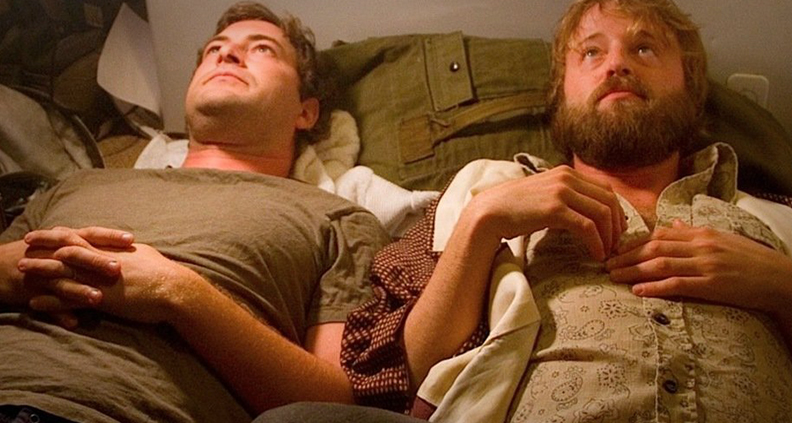In my opinion, one of the best decisions made in designing the Someone to Watch Award is that it’s notably not restricted to first features—there’s already an award for that. Instead, the annual Film Independent Spirit Awards prize (and its accompanying $25,000 grant) is bestowed upon a filmmaker who has arrived at the verge of household name status—at least in the kinds of households that tune in to watch the Spirit Awards. Normally, when cinema experiences an epochal movement that gives birth to a new generation of filmmakers, we give that movement an important-sounding name, like “German Expressionism” or “Italian Neorealism” or “The French New Wave.” What we don’t do, generally, is saddle it with a moniker specifically designed to mock it. But so divisive was the “Mumblecore” film movement of the 2000s that no one—not even the Bujalskis, Duplasses and Swanbergs of the world, whose careers blossomed from it—will publicly identify with it. Maybe we’d be in a different boat if my alternative name, American Emo-Realism, had caught on. But alas, I never got any traction there. Most of the criticisms of Mumblecore that don’t revolved around a perception of aesthetic ugliness take on the subgenre’s navel-gazing depiction of privileged white males. But Shelton, along with Greta Gerwig, is not only one of the two biggest female names to come out of the scene (a nod of respect to Ry Russo-Young, who made her studio debut in 2019 with the underrated The Sun Is Also a Star), but her movies also directly examine that very privilege. My Effortless Brilliance is just one of multiple Shelton features about sad men whose intelligence and sensitivity make them as sympathetic as they are hilariously ineffectual members of society.
Sean Nelson (of rock bands Harvey Danger and The Long Winters) stars as mildly successful novelist Eric Jones. In the opening sequence, we see him puttering around his Seattle house, cleaning his typewriter, chatting on the phone and—in bloviating soliloquy—rehearsing pompous answers to interview questions. When we finally see him interact with another person face-to-face, it’s Dylan (Basil Harris), who has only come by to tell Eric what an awful friend he’s been and then leave again. An unspecified amount of time later, Eric has traveled to Walla Walla for a book reading/signing and decides to make an unannounced visit to Dylan’s new home, a remote cabin near a river at the foot of some wooded hills. What follows is brief (the movie’s entire runtime is under 80 minutes) and deceptive in its comedic slightness; see Dylan’s understated warning about cougars and mountain lions in the area: “They’re hard to predict.” Most of the film is comprised of three men—Eric, Dylan and Dylan’s new wood-chopping buddy, Jim (Calvin Reeder)—getting drunk and talking about Charles Bukowski, Liv Tyler and anything else but their actual feelings. In other words, a typical night for emotionally underdeveloped men who are smart enough to make lots of clever jokes but nowhere near wise enough to address the rift in their friendship. Everything is kept small and on the surface, but Shelton and her cast never let us look away from Eric’s insecurities and delusions the way he and the entire social group he represents tend to do. Shelton, in her subsequent filmography, would return to the subject of sad white men in films like Humpday, Your Sister’s Sister and Outside In (while Touchy Feely and Laggies revisit the female focus of We Go Way Back.) Meanwhile, she honed her already impressive comedy chops helming episodes of New Girl, The Mindy Project, Master of None, The Good Place, Fresh Off the Boat, Love and more. She also directed a Marc Maron comedy special and episodes of Maron’s sitcom and Netflix’s GLOW, in which Maron co-stars. So that explains why, for last year’s Sword of Trust (a 2020 Film Independent Spirit Award nominee this year for Best Editing), she cast Maron as one of the core four ensemble players in an assured, goofball comic romp that, once again, says more than it seems to about the type of people it concerns. In this case, it’s about progressives who have the luxury of mostly ignoring the awfulness of our time and are only motivated to take a closer look when they stand to make some money. When out-of-town couple Cynthia (Jillian Bell) and Mary (Michaela Watkins) find themselves in Alabama to inherit a Civil War sword from Cynthia’s dead grandfather, all they want to do is get the item off their hands. But after taking it to a Birmingham pawn shop owned by Mel (Maron), they find out it’s worth a lot more than they thought—provided they’re willing to do business with the racist conspiracy theorists who want it. These three, along with Mel’s doltish employee Nathaniel (Jon Bass), head into the ridiculous, but dangerous, belly of the risibly ignorant beast.
Eleven years and a boatload of credits separate My Effortless Brilliance from Sword of Trust. And the increased filmmaking sophistication shows—as does the increased budget. But connective tissue is still apparent. Mel is yet another wry Sheltonian motormouth who uses sarcasm to avoid confronting real emotions, and although he’s lived in Alabama for fifteen years, his New York City past still makes him as much a city mouse among country mice as Eric. Mel didn’t grow up in New York, though. He’s from New Mexico—the same state where Maron himself spent most of his formative childhood years. It’s likely, then, that the character was shaped around the performer, indicative of the collaborative spirit in which Shelton has often worked. Sword of Trust’s screenplay is credited to Shelton and writer/comedian Mike O’Brien, who appears early as a deluded YouTuber. 2017’s Outside In was co-written by lead actor Jay Duplass, and My Effortless Brilliance has a writing credit for every member of the cast, including Jeanette Maus, who appears for one scene as a journalist. Whether you want to use the derogatory name or not, Mumblecore has had a lasting influence on American cinema. And Shelton, with her ever-growing talent and her radical openness, continues to be a shining example of what that movement, or any movement, can be. Other nominees: Nina Paley, who directed Sita Sings the Blues, has continued her animation career with multiple short films. She released her feature follow-up, Seder-Masochism, in 2018. 2008’s other Someone to Watch nominee, meanwhile, has a directing career that—if not quite as prolific as Shelton’s—has earned him even more prestige and critical praise. Barry Jenkins made his feature debut with the Mumblecore-adjacent Medicine for Melancholy (which was also nominated for Best First Feature and Best Cinematography.) But you might know him better from his sophomore effort, 2016’s Moonlight, which took home six Spirit Awards, and his most recent, If Beale Street Could Talk, which took home three (both winning Best Feature.)
The 35th Film Independent Spirit Awards will be broadcast exclusive on IFC Saturday, February 8 at 2:00 pm PT / 5:00 pm ET. Check out all of this year’s nominees here. Interested in attending the 2020 Film Independent Spirit Awards? Contact Jennifer Murby at 323.556.9353 or jmurby@filmindependent.org to learn more. The Film Independent Spirit Awards are sponsored by Premier Sponsors American Airlines, IFC and Mazda. Bulleit Frontier Whiskey is the Official Spirit. FIJI Water is the Official Water. Getty Images is the Official Photographer. Town & Country Event Rentals is the Exclusive Rental Company.
Follow Film Independent…
Twitter YouTube Instagram Membership

